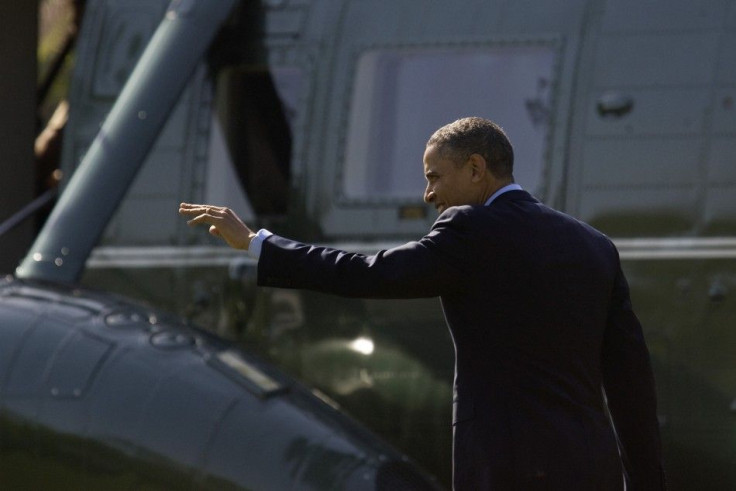Obama’s Historic Visit To Colombia Loaded With Potential Conflicts

U.S. President Barack Obama will make his first state visit to Colombia this weekend in conjunction with the Summit of the Americas.
Obama, who will become the first U.S. president to stay overnight in Colombia, is expected to discuss increasing trade ties between his country and Latin America; the situation in Communist Cuba; U.S. immigration policies and the drug war, among other issues.
Leaders from 34 nations in North America, the Caribbean and Latin America will attend the summit. However, Cuba was not invited.
According to Ben Rhodes, White House Deputy National Security Advisor, Obama will arrive in Cartagena on Friday evening. Among other items on his agenda, Obama is expected to hammer out a free trade agreement with Colombian President Juan Manuel Santos.
Cuba’s absence from the summit may be a point of contention.
Ted Piccone, a Brookings Institution senior fellow who specializes in U.S.-Latin American relations, told CNN: There is a lot of disagreement about the U.S. policy toward Cuba... Cuba doesn't have a democratically elected government and therefore doesn't meet the criteria.”
While Cuba is blocked from the summit, another prominent anti-American leader from Latin America, Hugo Chavez of Venezuela, is expected to attend, according to Colombia’s foreign minister, Maria Angela Holguin. However, due to Chavez’ cancer treatments, his appearance may not be guaranteed.
Obama’s visit to Colombia may also be an attempt by the president to shore up his support among U.S. Hispanics in his re-election bid – some 21-million Latinos are eligible to vote in the 2012 poll. Obama carried almost 67 percent of this key voting segment in 2008.
Nelson Cunningham, a former special adviser on Western Hemisphere affairs to Bill Clinton, told AP that U.S. presidents have understood that the right Latin American policies and relations could match the right domestic relations toward Latinos and immigrants.”
Another key topic at the summit will likely be the thorny issue of drug legalization – something that U.S. has strongly opposed, while some Latin countries, including Guatemala, have advocated as the only way to combat the violence wrought by narcotics trafficking.
In a report issued just prior to the summit, the Council on Foreign Relations wrote: “A number of Latin American presidents past and present have supported the idea [of drug legalization]. Washington has said it is willing to listen to the discussion, though the National Security Council's Senior Director for Western Hemisphere Affairs, Dan Restrepo, confirmed that the Obama administration has been quite clear in [its] opposition to the decriminalization or legalization of illicit drugs.
The summit’s host, Colombia, once riddled by endemic drug violence itself, has enjoyed something of an economic renaissance in recent years. The economy expanded by almost 6 percent last year and attracted a record $14.5-billion in foreign investment.
Finance Minister Juan Carlos Echeverry told the Washington Post just before the summit: “People want to come to Colombia. There has been this humongous, tectonic change of stereotype of Colombia, to promised land from wasteland.”
Indeed, the leftist Revolutionary Armed Forces of Colombia (FARC) recently announced that it would cease its longtime practice of kidnapping and also vowed to release all military and police hostages. The statements were hailed as a sign that FARC is looking for a peace deal with the government.
Still, in an election year, Obama may have to be careful in how he deals with his Latin counterparts.
The Inter-American Dialogue, a U.S.-based policy analysis group, cited the many differences between Washington and Latin America, in a report issued prior to the summit.
“Relations between the United States and Latin America are at a curious juncture,” the group said.
“In the past decade, most Latin American countries have made enormous progress in managing their economies and reducing inequality and, especially, poverty, within a democratic framework. These critical changes have brought greater autonomy, expanded global links, and growing self-confidence. It is now the United States that is in a sour mood, struggling with a still weak economic recovery, diminished international stature and influence, and fractured politics at home.”
Regarding Cuba, IAD commented: “Policy towards Cuba has long divided the United States from the rest of the hemisphere. There is a consensus among the other nations of the hemisphere that Washington’s 50-year-old embargo has not worked and, in fact, may have been counterproductive, prolonging Cuba’s repressive rule rather than ending it. Greater engagement with Cuba and more openness to easing US restrictions on the island are essential.”
The IAD concluded: The U.S. position on these troublesome issues - immigration, drug policy, and Cuba - has set Washington against the consensus view of the hemispheres other 34 governments.”
© Copyright IBTimes 2024. All rights reserved.











